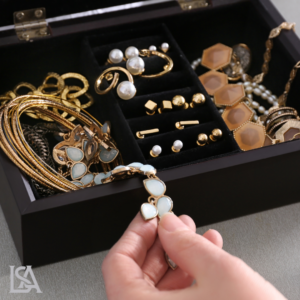Handling Sentimental Belongings in Estate Planning
We’ve covered many topics on how estate planning secures wealth distribution according to your preferences. However, what about items with less financial value but significant sentimental value? Often, there is no clear path for who will receive these sentimental items and heirlooms, which can spark disputes during the already emotionally charged time of grieving. Let’s explore the division of sentimental belongings in estate planning

Giving Value to the Little Things
Big ticket items, like cars and houses, are the first things most people want to address in their estate planning. And while these items rightly take precedence over the smaller ones, you mustn’t overlook the heirlooms! Let’s take the classic example of jewelry: many women do not realize how much jewelry they own or the value that it could potentially hold. For instance, a woman once bought a used ring at a thrift shop many decades ago that she believed was costume jewelry. However, it ended up being real and worth hundreds of thousands of dollars when her family got her collection appraised after her death.
Monetary gain aside, losing a beloved family member is very hard for those they leave behind. It is not uncommon that their loved ones want to wear or hold onto sentimental items that help them remember the person. For example, a daughter may wish to inherit her mom’s favorite necklace, not for monetary gain, but to wear it and feel close to her mom again. For these reasons, addressing your personal belongings in the estate plan is important.
Ways to Address Sentimental Belongings in Estate Planning
A residuary clause or a remainder clause can address personal items. This clause states that one or multiple beneficiaries will receive any remaining property after specific gifts (the residuary estate). Since a single beneficiary gets all personal items, fewer issues arise. However, when there is more than one beneficiary, it can be a much different story.
In the best-case scenario, each beneficiary agrees on which personal belongings they receive. Maybe grandma’s ring was important to one granddaughter, and her earrings meant more to her other granddaughter. Different items hold different meanings and memories for each person, so sometimes, this can work out. However, if multiple beneficiaries want to claim one item in particular and can’t reach a solution, the unresolved conflict escalates to a legal dispute.
Your estate planning attorney can help you decide the best way to handle your personal items in the estate plan. Some people like to gift personal items during their lifetime so that they can rest assured knowing that each item goes to whoever will most value it. Another option is a personal property memorandum, a separate document from the will that lists specific items and the intended recipients.
The Value of Planning with Law Stein Anderson
Without a doubt, the careful consideration of personal items is ensured by a proper estate plan crafted by an experienced estate planning attorney. Guidance in making specific bequests, reducing the risk of conflict, and ensuring that wishes are honored can be provided by one of our expert attorneys. We work towards two goals: providing you peace of mind and preserving family harmony. Contact us today.
